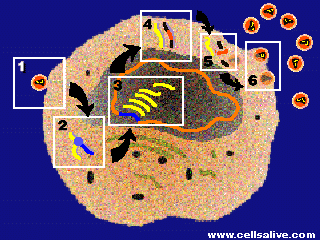Human Immunodeficiency Virus (HIV) Infection
This page was developed by Jim Sullivan of Cells Alive!
and has been duplicated with his permission.
![]()
Overview of HIV Infection
Human Immunodeficiency Virus (HIV) presents a complex knot for scientists to unravel. After initial contact and attachment to a cell of the immune system (e.g. lymphocytes, monocytes), there is a cascade of intracellular events. The endproduct of these events is the production of massive numbers of new viral particles, death of the infected cells, and ultimate devastation of the immune system.
However, the knot IS becoming unraveled. These pages attempt to simplify HIV infection at the cellular level. The following diagram shows a number of steps from initial attachment of a viral particle to a lymphocyte through budding of new viruses from that cell.
 |
1. ATTACHMENT 2. REVERSE TRANSCRIPTION 3. INTEGRATION, TRANSCRIPTION 4. TRANSLATION 5. VIRAL PROTEASE 6. ASSEMBLY & BUDDING |